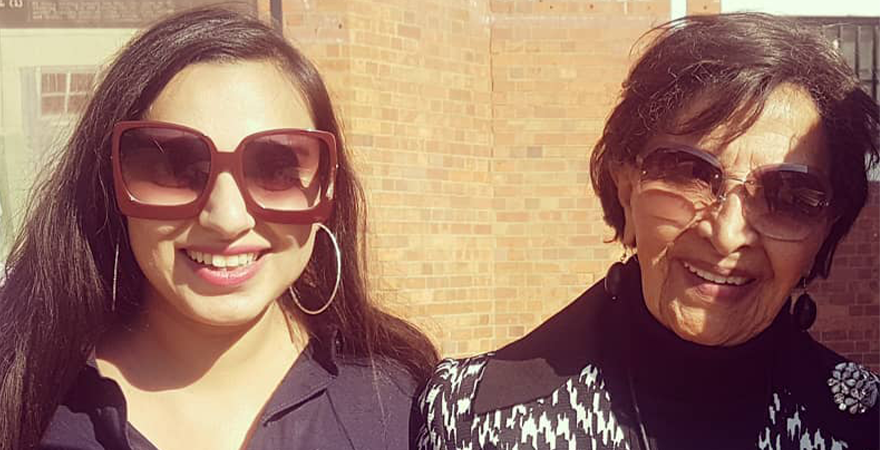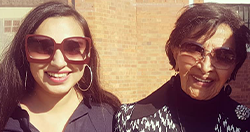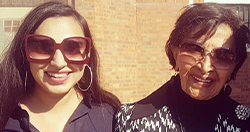Dr. Shakira Choonara is a One Young World Ambassador representing South Africa. She was appointed to the inaugural African Union Youth Council and named South Africa's 2017 Woman of the Year in Health.
Twitter: @ChoonaraShakira
The views expressed in this article reflect those of the author, not those of One Young World.

Every 9th August in South Africa, we commemorate the 1956 Women’s March. It’s a date many of us highlight in our calendars for networking breakfasts or inspirational talks by high-flying speakers. That is what Women’s Month in South Africa has really come to signify, right? We hear the main names bandied about here and there: Lilian Ngoyi, Helen Joseph, Sophia de Bruyn (Aunt Sophie, as she is fondly known). But, for millennials, there isn’t much substance to it, nor do we use this time to truly tackle our issues head-on. That’s often pushed to the 16 Days of Activism all the way in November and December.
A few years ago, as part of the Ahmed Kathrada Foundation Youth Programme, I had the opportunity to listen in awe to Aunt Sophie, who was at the forefront of the 1956 Women's March, protesting new laws for women under the apartheid system. She glamorously walked in, but humbly and eloquently addressed us. Hearing her first hand, trust me, is enough to inspire a lifetime of activism.
That Saturday morning in Newtown, Johannesburg remains etched in my mind as Aunt Sophie recounted the march. She explained the challenges of activism in those days to the young audience: the lack of technology, how she walked close to 20 kilometres each way to prepare each day, and how many activists sold vetkoeks and other foods on the street to bolster their meagre funds.
I was especially inspired by Aunt Sophie's recollection of the demonstrators' nonviolent approach. She told us, “We didn’t turn bins over. We didn’t burn anything; we walked and protested, silently and with absolute dignity. We were all disciplined”.
Being a tad rough around the edges, with next-to-no networking ability, I did not approach Aunt Sophie that day. I admired her from afar, and her words never left me. As I trained upcoming young health activists around the continent, I would often retell her story.
Last week, on 4 August, I was invited to facilitate visits to the gravesites of famous activists, which was a bit outside my high-flying comfort zone of First Ladies or Directors and the like. Having finally begun to master the art of conversation, fears aside of the graveyard, I wanted to meet Aunt Sophie for real. I wanted to get to know her–who knew if I'd ever get such an opportunity again?
We went on an old white bus to Avalon Cemetery south of Johannesburg. One participant described it as an excursion. I whipped out my pink book like a priest of sorts. I was still confused as to why Helen Joseph and Lillian Ngoyi had a shared tombstone. Another attendee had asked if they were buried on top of each other–trust me, I was still confused. Searching online, one realises how scattered the information about our country's most inspirational women.
I began the visit by pointing out that Ma Lillian Ngoyi was the first-ever woman appointed to the National Executive Committee of our majority party, the African National Congress. Though she worked hard for little pay as a seamstress, she nevertheless delivered thousands of petitions to Prime Minister Strijdom during the 1956 Women's March. Aunt Sophie mentioned that the three colours of the ANC we see today are actually Ma Lillian’s creations.
Elinor Sisulu, the daughter-in-law of Albertina Sisulu, came forward. She shared that Helen had asked to be buried with Lillian and had made these arrangements prior to their death. This was news to me, and I realised what an excellent example of unity and anti-racism their grave represented. We shared more interesting facts about the women buried there: Helen Joseph read out clauses of the Freedom Charter and survived various assassination attempts, including bullets through her bedroom window and a bomb at her gate.
It’s now a rare occurrence to come across leaders who speak with wisdom, vision and unity. When a person of Aunt Sophie’s stature speaks, their words stand against the test of time, a time in which we now see growing hatred and social division. Still, though, we have courageous words which few will utter. I quote Aunt Sophie as she delivered her address at Constitutional Hill and at the various gravesites of iconic women:
"Today there is no progress in bringing races together … We are more apart now than ever. I never thought the day would come, so I approached leaders in this city (Johannesburg) and said I never thought I would see a day where I would be called a minority in this country again.
I heard an encounter recently where young people in our country thought whites should go back to Europe, Indians back to India. And because they could not define Coloured people, they weren’t quite sure where to send us to.
August 9 cannot be celebrated with extravagant things, not gala dinners. We need to change our mindsets and do things in hospitals and schools. And nowadays, this celebration is not what we, the 1956 generation, were about.
Setting a foundation is good, but leading by example is what we need. We never called ourselves leaders, never like you hear today. We were all servants of the people. We drafted the Freedom Charter asking people what they wanted ideal South Africa to be."
Who would have thought a graveyard visit would be one of the best Women’s Day celebrations of my life? I felt emotional as I thanked Aunt Sophie for sharing her wisdom, as it’s not what we’re used to hearing these days. I also shared my admiration for how hip she is with her apps, iPad and iPhone. Speaking with her, I realised that I needn't have been afraid of approaching Aunt Sophie the first time I heard her speak; she fully opened herself up to everyone in attendance, taking an interest in who they were and listening genuinely to their ideas. In my opinion, she could teach a number of public figures a lesson on humility and character. I left the gravesite inspired by both Aunt Sophie's dignified, compassionate leadership and her kindness and warmth as a person. Her words must be amplified in every part of the globe where hatred and greed reign at the expense of humanity.
Finally, visiting the gravesites of Helen Joseph and Rahima Moosa reminded me, as a healthcare professional, that our hospitals are certainly not living up to their names. Perhaps we need to reflect on the example of our women leaders and take action to make them better and more equitable–a responsibility that I must to bear as well.


